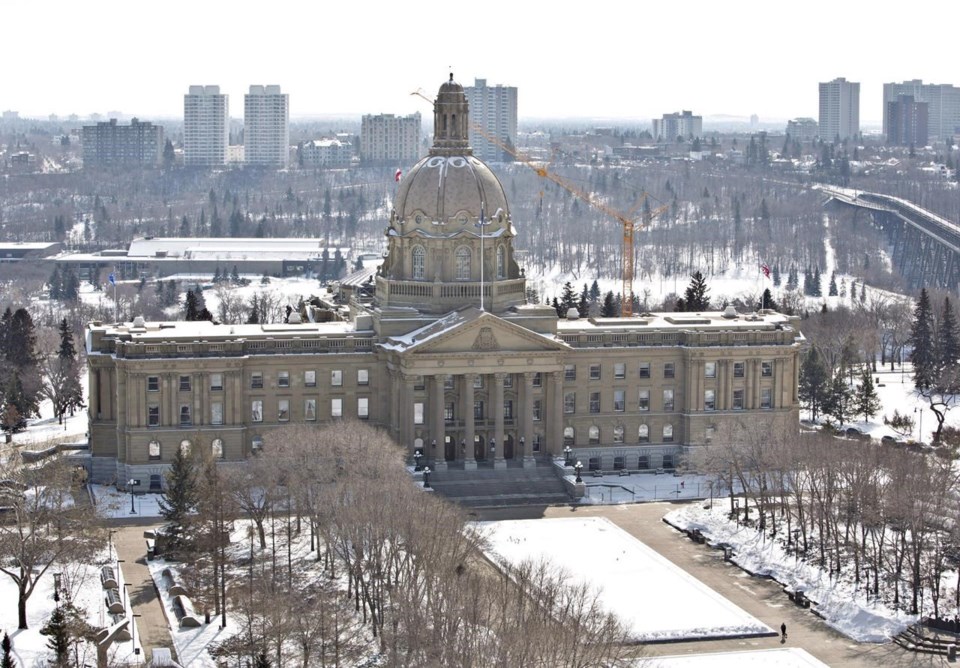Alberta politicians are set to return to the legislature this week for a spring sitting that is expected to see the first steps on sweeping structural reforms to a health-care system grappling to find and keep family doctors.
The sitting begins Wednesday and is to be followed Thursday by the release of the 2024 provincial budget, which Premier Danielle Smith has signalled will not keep pace with Alberta's growth.
Dr. Paul Parks, who speaks for physicians as head of the Alberta Medical Association, says they need solutions immediately.
"Time truly is critical and of the essence (for family medicine) right now," said Parks in an interview.
"We're waiting with bated breath to see what happens."
Parks has said Alberta’s billing system has not kept up with office and administration costs for family physicians, a problem made worse by inflation, forcing more and more to decide whether to stay in general practice or switch to a specialty.
The United Conservative Party government committed late last year to spending $200 million to help family doctors keep the lights on while a new funding agreement with physicians is hammered out.
Alberta is not the only province dealing with a physician shortage, but the problem has had a disastrous knock-on effect through its health system as more patients without primary care seek aid in crowded emergency departments.
Parks said it's only got worse in Alberta after other Canadian provinces brought in new funding models for family doctors that had significant increases.
"We do not have an Alberta advantage, specifically when it comes to primary care and family medicine access. We have a distinct disadvantage right now," he said.
The province has yet to release a list of bills to be introduced in the sitting but has indicated legislation is coming to begin the promised dismantling of Alberta Health Services — the $17-billion agency tasked with delivering front-line care provincewide.
AHS is to be replaced by four agencies while being reduced to the role of service provider in acute care.
The model has raised concerns that the four areas — primary care, acute care, continuing care, and mental health and addiction — could fail to be integrated and put care at risk.
Parks said he's extremely concerned about a restructuring in the middle of a health-care crisis.
"That's the black box we're really worried about," he said.
"As an example, they're going to create a primary care organization, but what does that look like if you don't have family medicine specialists and rural generalists to base it on?
"And what is that structure going to look like, and what's the governance, and what's it going to look like for patients as they move between the organizations?
“All those unknowns are growing."
Smith warned in a televised address last week that softening oil prices mean provincial funding won't keep pace with population growth.
She said spending cuts won't be needed but the government would need to show some restraint. Priority would be given to health, education and social supports, she added.
Smith also reiterated she he won't be immediately following through on a 2023 election campaign promise to make changes to tax rules to help families keep more cash in their pockets.
Government house leader Joseph Schow was not made available to comment on the spring sitting, but his office emailed a statement Monday.
"Alberta’s government is looking forward to continuing to deliver on its mandate received by voters, and I will have more to share on the spring session in the coming days."
Opposition NDP house leader Christina Gray said she expects between eight and 10 bills to be introduced.
Gray said the NDP will push the UCP to fulfil its promises and fix chaos and overcrowding in health care and education.
"The government of Danielle Smith is letting down Alberta families," Gray said in an interview.
Any changes to the health-care system, she said, would need financial resources.
"We're really concerned about what we are going to be seeing from this government," she said.
Gray said the NDP would also continue to challenge recently announced changes by Smith to rules for transgender youth.
Smith has promised restrictions on youth changing their names or pronouns at school, as well as on hormone treatment and surgery for gender affirmation.
The premier also said there would be a clamp down on transgender female athletes competing in women's and girls' sports.
These legislative changes are expected in the fall. But, Gray said, "Because they are of such urgent importance to Albertans, we will have to be talking about it (now).”
The NDP also finds itself in new territory for the first time in a decade.
A leadership race is underway to replace Rachel Notley as leader. Notley has said she is staying in the job until a replacement is picked June 22.
This report by The Canadian Press was first published Feb. 26, 2024.
Colette Derworiz, The Canadian Press




